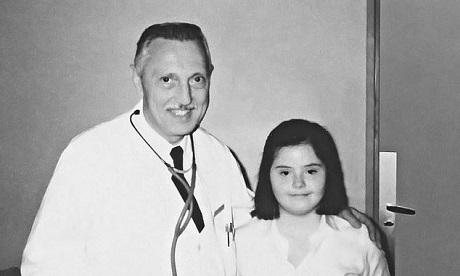Jérôme Lejeune – who dedicated his “scientific genius” to serving children with Down syndrome and their families, was a servant of life, love and truth, says Aude Dugast.
He was like “a fourth Wise Man,” offering his gifts of intelligence and medical and scientific know-how to a vulnerable child who “was waiting for him,” she says.
The French geneticist (13 June 1926 – 3 April 1994) was one of the most important “servants of life in the world” says Dugast, who wrote the late scientist’s biography and is officially promoting his sainthood cause.
Lejeune was also “a servant of charity,” she says. He showed unconditional love that was rare at the time for these born and unborn children who were at risk of abortion.
Dugast spent 14 years researching and compiling evidence for Lejeune’s cause.
She compiled the research into a book “Jérôme Lejeune: A Man of Science and Conscience.”
In it she outlines the Lejeune’s life and work. He contributed to finding the cause of Down syndrome, staunchly opposed abortion and tirelessly supported his “tiny patients” and their families.
Lejeune’s cause advanced this year when Pope Francis recognized his life of heroic virtue and declared him “venerable.”
The confirmation of a miracle attributed to his intercession will be needed for the next step in the process, beatification.
Working with others, Lejeune found evidence in 1958 that the physical and intellectual impairments of Down syndrome or Trisomy 21, were caused by an extra copy of chromosome 21.
This “was a revolution for the family,” Dugast says. Until then, people believed the birth of a child with this impairment “was the end of the world.”
Many imagined it to be a punishment for sin, a genetic impairment that could be passed on by other family members and a matter of shame.
The stigma for many remained, however.
Dozens of mothers told Dugast meeting Lejeune was the first time anyone looked at their child with love rather than disgust or embarrassment.
He showed “so much love it was as if he had before him a prince or Christ on the cross or, another (mother) told me, ‘He looked at my child as if he had the eyes of Christ,’” Dugast says.
He would hold and play with the child and speak humbly and truthfully to the parents in an uncomplicated way that somehow transformed them, giving them “a new strength” and a feeling they were no longer alone in the world.
While he couldn’t find a cure for Down syndrome, he did “cure the hearts of the parents and child,” Dugast says.
“Instead of pursuing fame and fortune he dedicated himself to offering medical care and support to these children, especially as prenatal testing became more common and abortion was legalized.”
He believed funding, research and time was better spent on finding a cure and better care rather than using the field of medicine to kill the patient when a cure could not be found.
“When you kill a patient, you’re also killing hope, the hope in medical science,” Dugast explains.
“His holiness is founded on love … and his intelligence.”
Source
- Catholic News Service
- Image: Daily Mail
News category: World.




